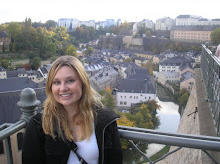
Considering the long history of this little country and the intensely independent character of its natives, one can see that it fits very well.
Today marks the day of my last two months in Europe, more specifically Luxembourg. To catch everyone up, I am currently in a small village named Kehlen (pronounced Kay-len). Kehlen is about 15km (roughly 7 miles) outside of Luxembourg (the country capital). I arrived in Luxembourg on the 22nd of September to find that my luggage did not arrive with me. Pol Castiglia, IFYE coordinator from Luxembourg, was at the airport to greet me and to take me to my first host family, The Meyer’s. The Meyer family consists of Claude and Claudine, Liz, age 18, Cathy, age 16 and Felix, age 13. Both parents work outside the home and the kids go to school from 8 until 2 Monday through Friday. During the day, I have several options: I can go into town by bus, go to a museum, go shopping, cook or bake something, watch TV, read a book (a have my own library card nowJ), go for a walk, etc. I have countless opportunities and I have really enjoyed planning my schedule out everyday. I have also taken up knitting so I am currently learning how to make a scarf. This Thursday, I will meet the other two IFYE’s, Jacob Smith from Montana and Alissa Bumstead from Connecticut in Luxembourg City to show the sights and to catch up on each other’s experiences.
Last night I had to opportunity to meet Connie Smith, responsible for placing IFYE’s in host families), the secretary from IFYE, and a news reporter from the Luxembourg Press to interview me and my host family about our experiences. I thought is was good that the newspaper showed interest in the program so hopefully the word about IFYE and the organization will be better known for future host families and also delegates wishing to travel abroad and study different cultures.
I have been lucky enough to have my own personal tour guide, Mark, my host mom’s brother, show me around the city. Since I have acquired a certain wealth of Luxembourg knowledge I feel compelled to share it with my readers:
The written history of Luxembourg starts in the year 963, when Siegfried, Count of the Ardennes, and founder of the Luxembourg Dynasty, had a castle built on the territory of the present-day capital of Luxembourg. This castle was the origin of the establishment of a town, which later was to develop into a formidable fortress. At its height, the fortress was girdled by three ring-walls studded with 24 forts, and linked underground by a 23 km network of Casemates.
After a long period of foreign sovereignty, the Congress of Vienna settled the destiny of the country, by raising it to the rank of Grand Duchy, and by giving it as personal property to the King of the Netherlands William I of Orange-Nassau. The personal union between Luxembourg and the Netherlands lasted until 1890. During this period the political independence and autonomy were strengthened, and the democratic institutions were developed.
The 11th of May 1867 is one of the most important dates in national history. The Treaty of London reaffirmed Luxembourg's territorial integrity, and the political autonomy, which had already been granted by the Treaty of Vienna of 1839. Furthermore, Luxembourg was declared perpetually neutral, and the great powers agreed to guarantee and to protect the neutrality of the Grand Duchy.
Since 1890, when the Crown of the Grand Duchy passed to the elder branch of the House of Nassau, Luxembourg has had its own Dynasty. The present ruler, H.R.H. Grand Duke Henri, succeeded his father, Grand Duke Jean to the throne in October 2000, after having been appointed as "Lieutenant-Représentant" -the Grand Duke's official deputy- on March 3, 1998.
Grand Duke Jean's mother, Grand Duchess Charlotte, Duchess of Nassau, Princess of Bourbon Parma, died in 1985. Grand Duke Jean and his wife Grand Duchess Joséphine-Charlotte, the sister to Albert, King of the Belgians, have five children Henri, Jean, Guillaume, Marie-Astrid, and Margaretha.
Despite its neutrality, Luxembourg was occupied twice by German troops during the two World Wars. The Battle of the Bulge was to a great extent fought on Luxembourg territory. In 1948, the country gave up its neutrality, to join the various economic, political, and military organisations of Europe. Already forming a close economic union with Belgium since 1921, the Grand Duchy is a founder member of the EU, and was host to the first European institutions in 1953.










No comments:
Post a Comment